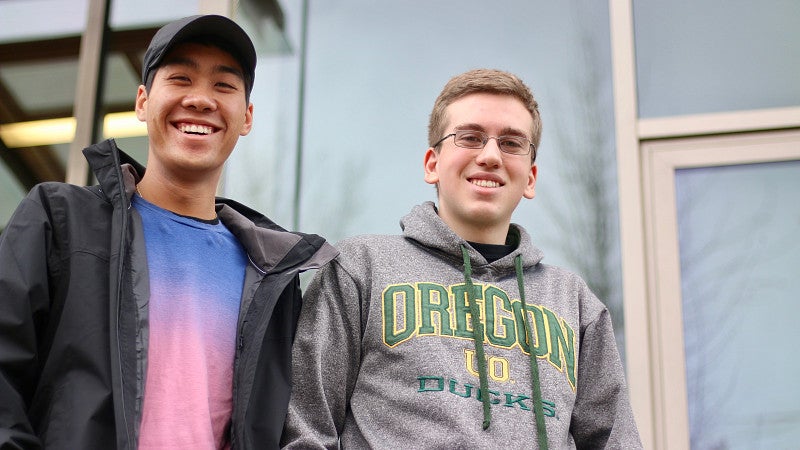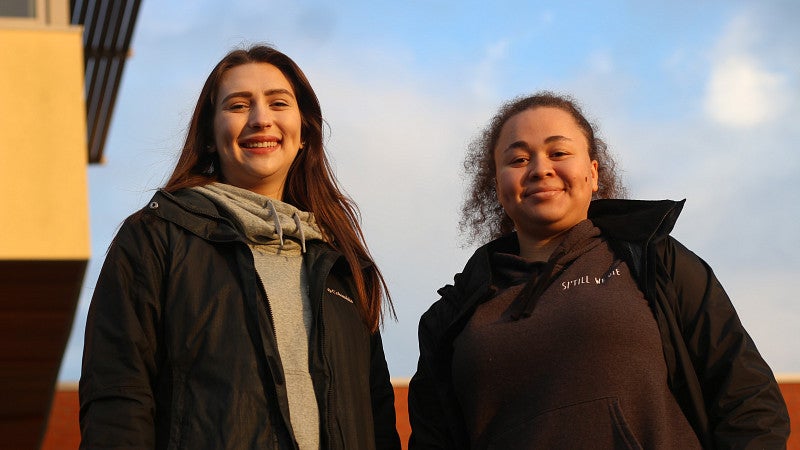By Derek Maiolo
Experience is the best teacher. That’s why the Clark Honors College founded a peer mentoring program specifically for recipients of the PathwayOregon scholarship, an award that covers tuition and fees for qualifying Oregon residents. The college’s program pairs incoming freshmen with upperclassmen who have similar interests or personalities, and who are also recipients of the PathwayOregon scholarship.
About 60 percent of Pathway recipients are first-generation college students, and many in the program would not otherwise be able to afford to attend the University of Oregon. They are a highly motivated group, with retention rates that regularly meet or exceed the average university rate. Pathway students also have access to a special team of advisors who help them maneuver the tricky subjects of financial aid, scholarships, and building a graduation plan.
In the honors college mentor/mentee pairs meet throughout the year to share meals, talk about school, and ultimately build connections that extend beyond the year of mentorship. From study skills, to navigating honors college requirements, to questions about getting involved in social organizations on campus, mentors are there to provide a student perspective.
Daniel Rosenberg, an honors college professor and co-founder of the mentor program, says the mentorships have made more incoming Pathway students confident in joining the honors college and better able to take advantage of all the college has to offer. “It has helped our numbers in both recruitment and retention,” Rosenberg says, “but above all, it has improved the experience of these students immeasurably.”
As the honors college puts finishing touches on its Diversity Action Plan, designed to guide programming within the college to welcome and support students, faculty, and staff from a variety of diverse backgrounds, it’s timely to take a closer look at if and how PathwayOregon students are finding success here. Bringing together students from a variety of social and economic backgrounds contributes to the rich exchange of ideas and discussion that is the hallmark of a Clark Honors College education, and the contributions Pathway students bring to our classrooms and our wider community are invaluable.
Now, Professor Rosenberg says that more and more mentees want to return as mentors to help the next wave of honors students navigate their college journeys. “It matters to them to pay it forward,” he said. “They know that when they graduate, this is part of what they contributed.”
As the program grows, more incoming PathwayOregon students in the honors college will receive guidance from mentorships like these. Rosenberg says he will continue to work closely with mentors to maximize the program’s impact on students. “Our goal is to make sure that students from diverse backgrounds feel welcome in the college and have every tool for success,” he says.
Ducks teaching Ducks. It doesn’t get much more Oregon than that.
Here is what current mentors and mentees have to say.
Blake & Dylan

Blake Holcomb, a Eugene native, has been familiar with the University of Oregon all his life. He was a mentor for the program last year, then returned as one of two mentor
coordinators this year. Now in his third year as a biology major, Holcomb has begun his own research with support from professors. He works in the Lewis Integrated Science Building, studying how smells are processed in the brain.
His mentee this year is Dylan Truong of Portland, who has not decided on a major thus far but has taken an interest in healthcare administration through some introductory business classes. Now, he wants to pursue research opportunities of his own in the business school.
“Even though he’s studying business and I’m in biology, the process for getting into research is the same,” Holcomb says. Getting to know professors, filling out applications for research opportunities: these are what students need to succeed, and they are skills Holcomb has honed.
“Because he has already gone through it, he offered me some suggestions to make my path easier,” Truong says. For Holcomb, the motivation is simple. As he said, “I just want to make sure that everyone is getting the best college experience.”
Delane & Maya

Delane Cunningham is a senior English major; Maya Tagwerker is a freshman who just started in the business school. Though the two may seem different on paper, the things they share — among them a bubbly personality and dedication to their classes — made them an easy pair.
“We both feel the same way about school, and we came for similar reasons,” Cunningham explains. Those include wanting to take the diversity of course topics offered by the honors college while being part of the larger UO community, and staying close to home. “We hit it off right away because of that,” says Cunningham.
With graduation just ahead, Cunningham is considering several graduate programs, particularly at UC Berkeley, UC Los Angeles, the University of Washington and the University of British Columbia.
Tagwerker has not yet decided on a business focus, but her talent and passion for math is pointing her towards accounting. Though a freshman, she is already enrolled in a rigorous 200-level business calculus class. She has also been considering rushing for Alpha Kappa Psi, a gender inclusive business fraternity. “We should talk about that later,” Cunningham chimes in. “My roommate is in that! I’ll introduce you two.”
Offering advice not just from her own experience in college but from her peers and professors has helped Cunningham bridge gaps in her expertise as a mentor. “Even if I can’t help or answer the question, I can find someone who can,” Cunningham says. It is that personal resource, someone who has already made connections with people around the university with their own networks and expertise, which makes the mentorship program so successful. As Tagwerker says, “It’s made it an easier transition knowing I can rely on someone who has been through it.”
About PathwayOregon
The University of Oregon’s promise of full tuition and fees, and comprehensive support for qualifying Oregonians
To be eligible for PathwayOregon, students must be Oregon residents, be accepted to the UO, have a 3.40 or better high school GPA, and qualify for the Federal Pell Grant – a program for undergraduate students with the highest financial need. More than 2,200 students receive support through PathwayOregon each year.
While PathwayOregon provides financial support, it doesn’t work like a typical scholarship. It’s more like a promise. As long as students remain eligible each year and make progress toward their degree, the UO agrees to cover their tuition and fees through a combination of federal, state, and UO grants and scholarships. The amount provided varies according to each student’s needs.
Created in 2008, the program ensures low-income Oregonians can attend UO and have the support the they need to graduate on time – and it’s working. In the decade since the program began, disparities in graduation rates between low-income students and their higher-income counterparts has almost vanished at UO.
A combination of federal, state, and university funds, along with private donations, make the program possible. The largest private gift for scholarships in the university’s history went to the PathwayOregon program — a $25 million endowment funded by Connie ’84 and Steve Ballmer. The program also helps the UO leverage Federal Pell Grant funding, combining these resources to make the most of each.
Are You Inspired to Give?
If you’d like to make a gift to the PathwayOregon program and help increase college access for lower-income Oregonians, contact Jen Parker
[jeparker@uoregon.edu | 541-346-8018]
